"The atmosphere was so happy"
- Published
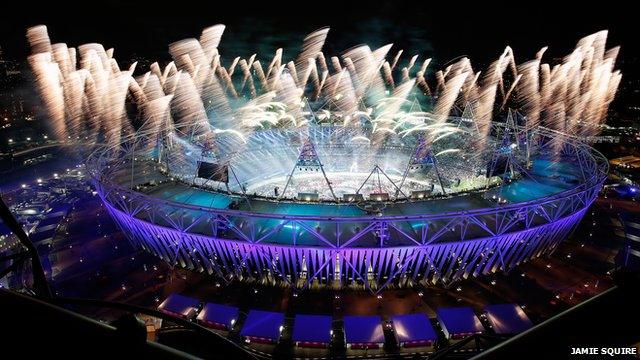
The firework finale of the opening ceremony for the London 2012 Olympic Games
The London 2012 Olympic and Paralympic Games created a wave of enthusiasm and inspiration for people across the United Kingdom.
According to an official report, the economic benefits from hosting the Olympics and Paralympics amounted to a £9.9bn boost in trade and investment.
But some think that the initial enthusiasm during and immediately after the Games was shortlived.
One year on, has the legacy of the Olympic and Paralympic Games been a positive one?
Here, BBC News website readers explain how the London 2012 Olympic and Paralympic Games have affected their lives.
Rosemary Head, Laindon, Essex
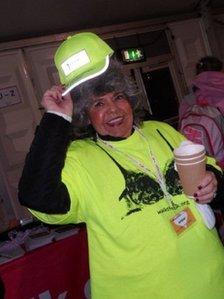
"Volunteering at the Games gave me a lot more confidence"
I was a volunteer during the Games. I loved every moment of it and have loved every moment since. Being almost 73 has not stopped me being involved in things!
Volunteering at the Games gave me a lot more confidence to go forward and do as much as I can in life.
Last year, after the Games, I wanted to continue volunteering. I realised how much I enjoyed interacting with and looking after people.
I've marshalled at the Moonwalk in London that raises money and awareness for breast cancer, volunteered for a food bank encouraging people in supermarkets to donate food to those in poverty and am also volunteering for the Anniversary Games at the Queen Elizabeth Park where I am hoping to meet the athlete Mr Bolt!
I have also raised money through charity nights and book sales. I went to Kenya and visited an orphanage there and paid for their whole nursery to be refurbished and took the children presents.
I've kept in touch with so many lovely people from when I volunteered at the Games and recently organised a get-together in London for some volunteers. It's been fantastic.
Flash Bristow, London
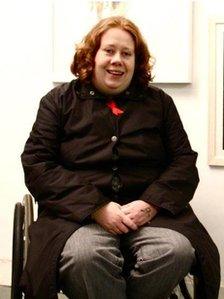
"I've been disappointed to find that some aspects of the 'legacy' have faded away altogether"
In many ways the Games have been beneficial. They fast-forwarded much needed improvements to the area where I live, about 10 minutes' drive away from the Olympic Park.
Nearby high streets, such as in Leyton and Leytonstone, were done up. One of the key improvements for me as a wheelchair user is that I can go along the high street without having to bump up and down kerbs.
And then there's the transport. The new Javelin service from Stratford to St Pancras is a lifeline for me. It's a quick and wheelchair accessible route to town, which I use every week whether for leisure or hospital appointments.
However, I've been disappointed to find that some aspects of the 'legacy' have faded away altogether. For example, people's attitudes.
During the Paralympics there was a spirit of hope and optimism, and I felt that disabled people were perceived as just that - people, rather than obstacles or someone who needed to be managed in some way.
I feel that we've been relegated back to someone that needs to be managed.
An illustration is the news that several stations on the new Crossrail train link, which is currently being built across London, will not have step-free access. In the days of post-Paralympic glory, why have we suddenly been shoved under the carpet again?
Pauline Stanley, London
"It has done so much for David's self-esteem and confidence"
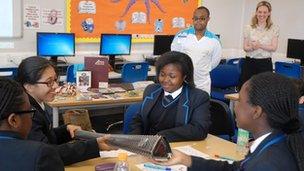
David stands in the background as the Saturday club pupils admire his Paralympic torch
The Games themselves were fantastic and the atmosphere amongst the people involved was so happy and animated.
For myself and my son David, who has Down's Syndrome, there was been a very personal legacy that came about because he was one of the Paralympic torch carriers.
One of my friends runs a Saturday school and asked if David could come and speak with the pupils, as she felt he would inspire them as he'd overcome so many challenges.
I made a poster showing what David had overcome, I took his council swimming medals and horse riding rosettes and spoke about the stigma and bullying disabled people can experience and different ways to communicate with someone with Down's Syndrome.
Then David arrived, wearing his London 2012 outfit and carrying his torch.
The children were all so excited to meet him, for many it was the first time they'd met some with a disability.
For me, it wasn't just about disability awareness, but also about inspiring other young people on what they can achieve when they see David's achievements.
We've since done the same at another school. For David himself, it has made an enormous difference as it has done so much for his self-esteem and confidence.
Piers Catton, Gosport
"Economically and commercially London 2012 nearly finished our company off!"
.jpg)
The product for which Piers tried to get a Locog licence
We stupidly thought we would be able to share in the London 2012 legacy as a new small business by being allowed to produce a unique souvenir designed, patented and manufactured here in the UK.
But economically and commercially London 2012 nearly finished our company off!
We tried for over six months to get a licence from Locog but virtually everything on the promotions/souvenir side was given to Chinese companies and UK companies sourcing their products 100% from China.
We all read the stories about the mascots being produced for virtually nothing in China by low paid workers and then sold for a ridiculous price here in the UK.
Our own British product which was totally unique and illustrated British design excellence never stood a chance.
We wrote to David Cameron, Vince Cable, and our local MP Caroline Dinenage and eventually got a standard letter back from Mark Pritt MP stating that over 90% of all contracts had been awarded to UK companies. This may be true but the manufacturing is nearly 100% in China so no new jobs for the UK economy just more imports.
London 2012´s legacy for me was a great sporting event on the day, but I also learnt that this country will never recover economically until we stop imports from China and manufacture things here in the UK instead.
For this there is no help, financial or otherwise and for us London 2012 instead of being an opportunity cost us over £300k in lost sales and nearly put us under!
Had we been granted a licence we would have employed over 30 young school leavers immediately, but instead we have now downsized our production capability and are considering moving production overseas.
Mike Williams, Maidstone, Kent
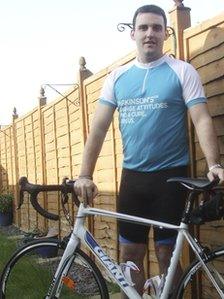
"The Games played a part in inspiring me to do something for my grandfather who suffers from Parkinson's Disease"
The Olympics were massively positive for me. They made me feel proud. I'm 35 and there is no chance of me getting to an Olympic standard in any sport, but the Games played a part in inspiring me to do something for my grandfather who suffers from Parkinson's Disease.
I decided to do a charity bike ride this September from Paris to Nice. Originally I was going to sign up for just one leg of the journey, but I am now doing all 800 miles.
The Olympics made me realised that with hard work and dedication I could really achieve something.
I've definitely got fitter in the past year. When I first started doing hill climbs, I couldn't do them in one hit.
I cycle to work sometimes now too. I've been bitten by the bug and will definitely do something else after the cycle ride. I'm hoping to join a local cycling club too.
Everyone, including me, had preconceived views about the Olympics. With everything else going on in the country, people had quite a jaded view about what the Olympics and Paralympics would bring.
But it was brilliant from start to finish and has inspired so many people since.
Kaarle Kulvik, London

"Perhaps the organisers were afraid of bad publicity, but is that worth sacrificing a whole business sector in London and Weymouth?"
Of course the Olympics were good for some companies, especially in the building sector, but the same is not true for many small businesses in London and Weymouth.
There was no one factor, but hotels putting their prices up and worldwide news talking of crowding in London and advertising huge queues in the tube, was not helpful.
All it did was drive people away from London as it gave the impression it was better, and cheaper, to stay away.
As a consultant for the retail sector I saw there was clear evidence that these tourists were not going to come: the number of visa applications were down, there were less booked flights, and half-empty hotels.
This was not widely reported. It was clear to larger companies who could adjust, as the tourist sector actually did give out early warnings in January.
The retail sector especially small shops, restaurants etc. should have been better informed so that they could have adjusted by ordering less Olympic-related products, and hiring less staff.
I think there was a sense of irresponsible behaviour because of the Olympics fever. Perhaps the organisers were afraid of bad publicity, but is that worth sacrificing a whole business sector in London and Weymouth?
David Stirland, Sutton-in-Ashfield
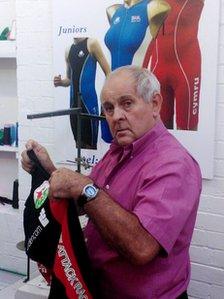
"Our business has grown dramatically because of the Olympics"
Our business has grown dramatically because of the Olympics. We manufacture beachwear and sportswear, such as triathlon clothing. We've had a steady growth over the years, but nothing major.
In the few months before the Olympics, we started getting more enquiries from individuals and clubs, and this continued through the Olympic period. Whereas normally things start to slow down for us in August, they didn't last year.
This year, sales have still not slowed down. We are up 50% on last year. We've had to employ four additional people this year and we have so many enquiries for kits, we might need to employ more staff!
The common denominator was definitely the Olympics. Triathlon at the Games was very successful.
We used to go to events that had 300-400 competitors. Now, when we go there are more like 1,500 people taking part.
I was thinking about selling the business, but it's been so good lately I don't want to now.